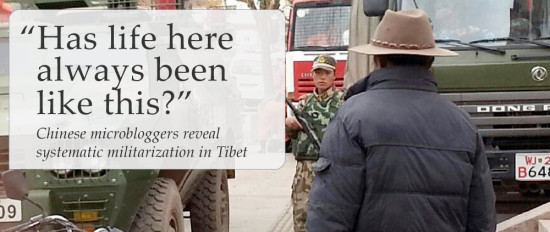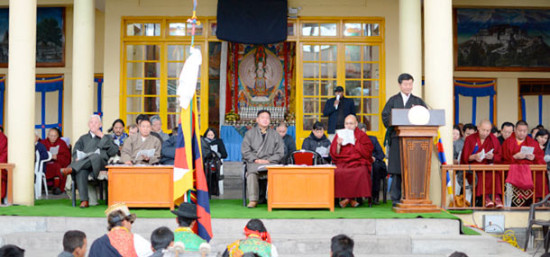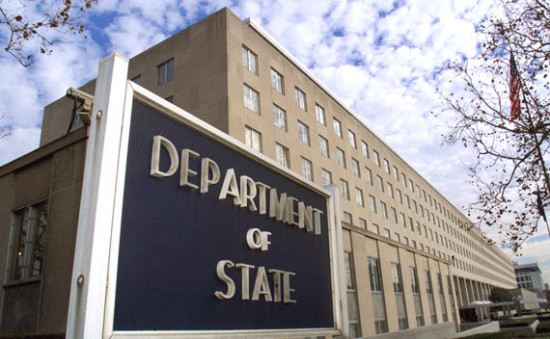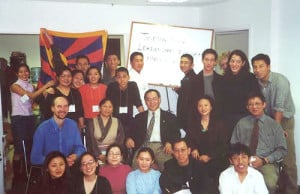New ICT report uses Chinese social media to show crackdown

Photo posted by Chinese tourist on Weibo social media site, taken in the town square, Chamdo, Tibet Autonomous Region, in early spring, 2013.
Images and messages shared on social media sites by Chinese tourists have been found to document China’s systematic militarization of Tibet, according to a new report by ICT. The report, released on the 55th anniversary of the March 10, 1959 Tibetan uprising that led to the Dalai Lama’s escape into exile, uses photos and messages posted to the micro-blogging site, Weibo, which show an expansive security apparatus that belies the Chinese state narrative of successful and inclusive government policies. The report is accompanied by a slideshow highlighting the main findings, as well as an appendix of the social media postings collected and analyzed by ICT.
Tibetans in exile commemorate 55th anniversary of Tibetan uprising

Sikyong Dr. Lobsang Sangay addressing the 55th anniversary of the Tibetan National Uprising Day in Dharamsala, India, on 10 March 2014. (DIIR Photo, Tenzin Phende)
This March 10 marks the 55th anniversary of the 1959 Tibetan uprising against Chinese military forces that had assembled in Lhasa. The event led to the Dalai Lama’s harrowing escape into exile, where he was soon joined by thousands of Tibetans fleeing the Chinese occupation. Commemorating the occasion, the head of the Central Tibetan Administration, Sikyong Dr. Lobsang Sangay, issued an address in which he stated, “The Tibetan people have risen time after time to overcome great adversities in the long history of our civilization. Today, our sense of identity, solidarity, and dignity is deeper than ever. If we remain united, and bring the rich traditions of the elders to interplay with the innovation and dynamism of the younger generation, I firmly believe that the Chinese government will have no choice but to address our aspirations.” Joining the Sikyong in marking the occasion, the Tibetan Parliament in Exile released a statement in which it recognized “all the Tibetan compatriots who died untimely deaths, or who have suffered or who to this day continue to suffer oppression for the national religious, political and fellow-nationals’ causes under the yoke of the imperialist and repressive policies of the government of China,” and strongly re-affirmed that, “The nature of the Tibetan struggle remains a resolute one of non-violence.”
Dalai Lama returns to Washington
The Dalai Lama returned to Washington this week, his second visit to the U.S. capital in a three week span. The Tibetan spiritual leader was invited by Senate Majority Leader Harry Reid to give the prayer at the opening session of the U.S. Senate on March 6, where he was greeted on the Senate floor by Senator Mazie Hirono, the Senate’s only practicing Buddhist, and Senator Diane Feinstein, one of the most ardent Tibet supporters in the U.S. government. The Dalai Lama was also welcomed by Vermont Senator Patrick Leahy, who said, “The world has to know the great faith of the Tibetan people, and their longing for the autonomy they deserve to practice their faith. Fortunately, they have as a symbol of that faith the Dalai Lama, a Nobel Peace Prize recipient, a man who touches everybody’s conscience.”
The Dalai Lama read from his favorite prayer, originally written by the 8th century Buddhist scholar, Shantideva. Broadcast live in the U.S. by C-Span, the Dalai Lama concluded, “So I am asking to serve humanity as long as space remains and as long as beings remain, until then, may I, too, remain and help dispel the misery of the world.”
Following the prayer, the Dalai Lama remained on Capitol Hill, where his itinerary included meetings with senior members of the House of Representatives and Senate, including House Speaker John Boehner and Democratic Leader Nancy Pelosi. Members of Congress and their staff later gathered in the Capitol Complex’s largest auditorium, where the Dalai Lama gave an address that included remarks on global responsibility and the environmental significance of Tibet. In the afternoon, the Dalai Lama met with members of the influential Senate Foreign Relations Committee, which included Chairman Robert Menendez and Ranking Member Bob Corker.
On Friday (March 7), the Dalai Lama delivered a sold-out address at the Washington National Cathedral entitled ‘Beyond Religion: Ethics for the Whole World.’ The talk marks the Dalai Lama’s fourth visit to National Cathedral; he last spoke at a September 11th memorial service, held in 2003, entitled, ‘Cultivating Peace as an Antidote to Violence.’
Spanish Socialist Party challenges parliamentary procedure to end Tibet cases
A representative from Spain’s opposition Socialist Party announced on March 4, that they would appeal to the Constitutional Court against a recent legislative procedure that would severely limit the pursuit of universal jurisdiction cases in Spain. The announcement follows a move by Spain’s leading Popular Party to fast-track a reform to Spain’s universal jurisdiction laws which would effectively preclude two lawsuits before Spanish courts focusing on China’s leadership for its policies in Tibet. Spain’s Popular Party introduced the measure following intense lobbying by the Chinese government.
Restrictive atmosphere for Tibetans in Nepal

In its annual Country Reports on Human Rights, released on February 27, the U.S. State Department found “limited freedoms” for Tibetans residing in Nepal, a situation that includes few legal protections for an already vulnerable refugee population. Included in the findings, the State Department reported that members of the Tibetan community are routinely harassed by police and local officials, and that the Nepalese government’s established pattern of interference has made the Tibetan community reluctant to hold public gatherings.
Tibetan New Year invites culinary exploration

Khabsey, a popular Tibetan treat.
ICT looks to train next generation of Tibetan leaders

The 2001 participants of the Tibetan Youth Leadership Program.

